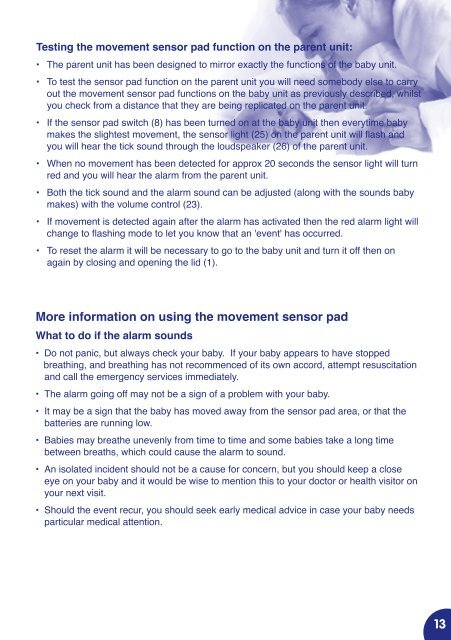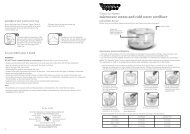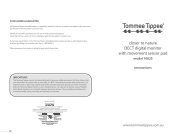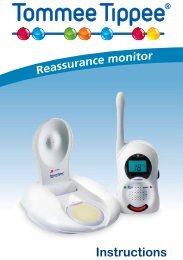helpline - Tommee Tippee Australia
helpline - Tommee Tippee Australia
helpline - Tommee Tippee Australia
Create successful ePaper yourself
Turn your PDF publications into a flip-book with our unique Google optimized e-Paper software.
Testing the movement sensor pad function on the parent unit:<br />
• The parent unit has been designed to mirror exactly the functions of the baby unit.<br />
• To test the sensor pad function on the parent unit you will need somebody else to carry<br />
out the movement sensor pad functions on the baby unit as previously described, whilst<br />
you check from a distance that they are being replicated on the parent unit.<br />
• If the sensor pad switch (8) has been turned on at the baby unit then everytime baby<br />
makes the slightest movement, the sensor light (25) on the parent unit will flash and<br />
you will hear the tick sound through the loudspeaker (26) of the parent unit.<br />
• When no movement has been detected for approx 20 seconds the sensor light will turn<br />
red and you will hear the alarm from the parent unit.<br />
• Both the tick sound and the alarm sound can be adjusted (along with the sounds baby<br />
makes) with the volume control (23).<br />
• If movement is detected again after the alarm has activated then the red alarm light will<br />
change to flashing mode to let you know that an 'event' has occurred.<br />
• To reset the alarm it will be necessary to go to the baby unit and turn it off then on<br />
again by closing and opening the lid (1).<br />
More information on using the movement sensor pad<br />
What to do if the alarm sounds<br />
• Do not panic, but always check your baby. If your baby appears to have stopped<br />
breathing, and breathing has not recommenced of its own accord, attempt resuscitation<br />
and call the emergency services immediately.<br />
• The alarm going off may not be a sign of a problem with your baby.<br />
• It may be a sign that the baby has moved away from the sensor pad area, or that the<br />
batteries are running low.<br />
• Babies may breathe unevenly from time to time and some babies take a long time<br />
between breaths, which could cause the alarm to sound.<br />
• An isolated incident should not be a cause for concern, but you should keep a close<br />
eye on your baby and it would be wise to mention this to your doctor or health visitor on<br />
your next visit.<br />
• Should the event recur, you should seek early medical advice in case your baby needs<br />
particular medical attention.<br />
13





